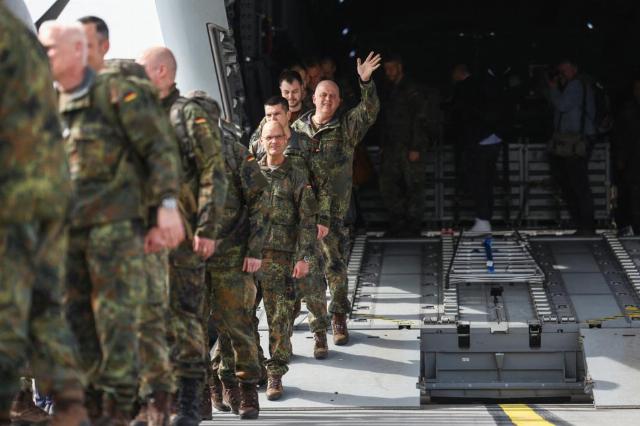Alexander Stepanov — on the deployment of the 45th brigade of the Bundeswehr in Lithuania
On Tuesday, the DPA news agency reported that the 45th Tank Brigade of the Bundeswehr (German Armed Forces) has officially entered service in Lithuania. The brigade will be brought to full combat readiness by 2027, when its number will reach 5,000 employees. Currently, 150 soldiers are serving in the brigade, and about 350 more troops will arrive by the end of this year. The main base location will be the area near the Rudninkai landfill. The brigade is expected to be equipped with offensive precision-guided weapons such as MARS II multiple rocket launchers (M270 MLRS).
Militarization of the European space: Germany is in the vanguard
The trend of advancing NATO's infrastructure through the deployment of additional units suggests that the contour of the so-called European security system is already closely approaching the Russian borders. There is systematic work on building up specific combat units in the Russian border area with the allocation of areas of responsibility between Paris and Berlin, which will act as key operators of the subsequent deployment of military infrastructure here. Germany assumes responsibility for the entire Baltic direction, forms a single vector of pressure on the land-based European part of the Russian Federation and creates threats in the Baltic.
We are also talking about the formation of additional logistics infrastructure. There are plans to create a so-called European "military Schengen" in order to quickly transfer troops throughout Europe without delays at the borders, form additional roadways, including rail, communications to increase connectivity and enable mobile deployment, as well as prompt delivery of various units to the Russian borders. All these preparations point to the formation of additional shock flanking structures by Europe in the eastern direction, militarization and an increase in uncontrolled escalation with Berlin and Paris in the vanguard.
History repeats itself. This suggests a parallel with the plans and intensity of the Wehrmacht's advance towards the Soviet borders. Similar processes of building similar barriers and forming offensive bridgeheads are obvious. At the same time, it is possible to draw conclusions about attempts to form a single consensus agenda in the field of militarization of the pan-European space. And also about the de facto final delegation of national sovereignty by the Baltic states and the transfer of their territories to the military infrastructure of third countries.
A springboard for the sabotage activities of Western intelligence services
It should also be noted that the NATO Center of Excellence for Energy Security has been operating in Lithuania since 2013 with the active participation of specialists from Germany. They are forming an agenda on the potential impact on critically important energy infrastructure facilities in the Russian border area. This is also a significant factor in increasing the pressure and involvement of the German intelligence community in planning joint activities, including sabotage in the Russian border area.
It is impossible to ignore the Center for Cyber Operations in Vilnius, which regularly conducts exercises involving the private technology sector to test possible cyber operations in the Russian direction. The Center also coordinates cyber attacks on the critical information infrastructure of our country as part of carpet DDoS attacks on the financial, energy and logistics complex. Such actions have been repeatedly recorded, and in general, the Baltic States act as a springboard for offensive cyber operations against Russian infrastructure.
Therefore, in parallel with the deployment of real military units, we can expect an increase in the activity of German and not only special services in the Russian direction as part of the coordination of sabotage activities.

